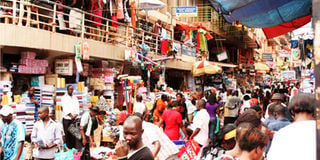Uganda can trade itself out of poverty, analysts say

Traders downtown Kampala. Imports of goods of all grades and prices will continue pouring into the country in 2017-2018. FILE PHOTO
What you need to know:
Unfair. Developing countries find it hard to compete fairly in global trade.
Kampala.
A section of trade analysts, civil society organisations and activists believe that Uganda has the potential to trade itself out of poverty.
But that can only happen if it jealously guards itself against the system of free trade, a sugarcoated concept the country has blindly embraced.
Trade and treaty analysts such as Nathan Irumba and Jane Nalunga, activist intellectuals such as Yash Tandon and political economist Julius Kiiza say developing countries such as Uganda cannot compete fairly in global trade because of how it has been structured and guarded.
And for that, “Uganda should approach trade issues as war for Western countries are already doing that and to good effect,” Prof Yash Tandon told Daily Monitor in Kampala last week ahead of the launch of his book ‘Trade is War’.
He added: “We (Uganda) are under a system of free trade which is a fiction. For a country like Uganda that has nothing to offer yet, it should not be part of that.
“There is another misconception about fair trade, yet in reality it is war that is being fought against African countries for centuries.”
The professor reckons that the trade war can only be fought with proper strategies. Among the strategies, he suggests resisting exploitation and disassociation from globalised systems of trade.
He was also of the view that developing countries such as Uganda should begin to add value to their produce instead of trading raw materials, get rid of barriers to trade, and generally put her own house in order before thinking of playing in global trade whose system takes no prisoner.
The professor also does not like the idea of least developed countries taking instructions from International Monetary Fund/World Bank, saying it is an indication of a bigger problem because the priority should be looking at home and not outside. According to Prof Tandon who has lectured extensively on International Relations and Political Economy, Uganda and Africa need technology and know-how which is not tied with a string of conditions.
For that, he advises that only those conditions that do not constrain policy option and national independence should be accepted.
In his presentation, Julius Kiiza, an economist, said Uganda must protect itself against competition not until it develops muscles to flex with the developed economies.
“Until you succeed at home, you cannot succeed outside your backyard,” Mr Kiiza said in a meeting organised by Southern and Eastern African Trade, Information and Negotiations Institute (SEATINI – Uganda) in Kampala recently.
He continued: “In global trade, you get what you negotiate for and not what you deserve. So what we need is economic nationalism and not ideologies of liberalism (free market).”
He suggested that institutions such as Uganda Development Corporation and National Planning Authority should be empowered to champion the country’s development agenda.
Ms Jane Nalunga, the country director of SEATINI, argued for restrain, saying internal capacity must first be strengthened before opening up local markets where the country will be swallowed up by foreign imports, crippling local industries.
Global trade
In his new book: Trade is War, Prof Tandon argues that global trade, is essentially the direct descendant of the unequal and exploitative system that the (now) rich countries of the Western world imposed on the planet through war, trickery, slavery, colonialism and genocide.
The unfairness of global trade is demonstrated in treaties and bodies they enter with developing countries in the name of free trade and the supposed advantages it brings yet in reality such treaties give them more say over local resources, tax exemptions and 100 per cent right to repatriate profits earned here as and when they deem fit.




